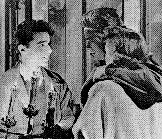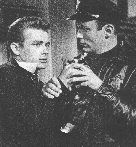
WE WANT EQUALITY!
Too bad if it screws you...
Paying the price
Some of us paying more than others.
Demanding the same respectable rights;
willfully dismissing social wrongs

Out in the cold
James Dean, as Jim Stark,
in Rebel Without a Cause.
Ditched by the House of Matrimony?
With absolute equality for same-sex partners, there will be winner and losers -- most losers on low incomes.
"This is why I (and other poor queers I know) have never thought that the struggle for gay marriage / same-sex benefits should be a priority for our movement."
Longtime lesbian activist
Chris Bearchell, 1999
In from the cold
Chris Bearchell's evolving menage on Toronto's Walnut Ave was home to way more than matrimony. Its life continues online, at:
Walnet
http://www.walnet.org
For its origins, see on their site:
97 Walnut Ave
For photos of a few of its revolving crew (featuring its most famed Safe-Sex Slut):
Danny Cockerline
at 97 Walnut
Another Walnut, "escaped lunatic" Irit Smirat, appears in
One Street, Many Stories: Queen
near the end of
Not at liberty
http://www.rbebout.com/
queen/libtrin/2pnotat.htm
Earlier households as hotbeds of activism appear in
On the Origins of
The Body Politic
midway through
Baby steps
http://www.rbebout.com/
oldbeep/baby.htm
At (even greater) length
For an extensive chronology of events on the same-sex spousal & marriage front, as reported in Xtra! 1999 - 2002, go to:
Only disconnect
Avid gay-marriage promo has led many to presume that all gay people think it's a great idea. And that, if we can win the right to be treated just like everyone else, we will all benefit equally. Few ask who "everyone else" might be; few ponder our society's massively unequal distribution of its benefits; few grasp the fact that "rights" for some people can come at the cost of social wrongs for others.
The fight for gay marriage has been -- if just in part and with fine subtlety, under the noble flag of "equal rights" -- a form of class warfare. If of course undeclared, even unrecognized by most combattants: questions of class ever fall below the cultural radar. Pressed to admit (as they rarely are) the potential effect of their efforts on people who don't fit their respectable model, marriage advocates fudge, dissemble, or drop a few crocodile tears over the "inevtiable costs of equality" -- which few of them will pay.
Mostly they go on as if they have never heard such messy questions -- never asked to seriously ponder "unfortunate side-effects" muddying the waters of their pristine and safely salable cause. But, if not having much pondered, they have heard. From, among others, a lesbian activist who has worked for years, often alongside them, not just for gay rights but fundamental justice. For everyone.
Chris Bearchell's career as a dyke dynamo covers nearly three decades (even as she has yet to see her 50th birthday). I first met her in 1977, just after I came on as one (of then just two) paid staff at The Body Politic. Chris, writing a column called "Dykes" since 1975, was often around -- as "Toronto's only lesbian."
Well, for a long time TBP's only one: she had already helped found LOOT, the Lesbian Organization of Toronto, few LOOTers then willing to put up with the boys. Chris was. She joined The Body Politic's governing collective in 1978, staying until the paper's demise in 1987. For four of those years she was also among the (still few) paid staff.
For all those years she was hugely influential. As she had been before, a key player not only with LOOT but the Coalition for Gay (later Lesbian and Gay) Rights in Ontario, a role she continued while at TBP (ever off to pressure, as she put it, "some turkeys from the government"), long chair of its Committee to Defend John Damien, a racing steward fired in 1975 solely for being gay.
She did TV with the Gay Offensive Collective ("This Program May Be Offensive to Heterosexuals"). She den-mothered a vibrant volunteer team of newswriters. She wrote editorials. And memos. She and I likely tie for the prize of most prolific producer of internal paper: The Body Politic lived on thought. Articulated at length.
Even after Chris left staff, even when The Body Politic was gone, her influence did not wane. She worked on an AIDS project with Inner City Youth; worked with Maggie's, a prostitutes' rights group and drop-in. An astute analyst of pornography, she made her own -- and passionately fought censorship. She has ever fought for the rights of queer kids, whatever their sexual orientation.
Chris lived her politics not just at the office or out on the street (it was she who, on the spot, coined a famed chant at the first demo after Toronto's massive 1981 bath raids: "No More Shit!"), but at home -- in queer households of well more than a couple. They were not rare then: many domestic hotbeds were connected with The Body Politic, and with the gay movement beyond. It's how we raised our kids.
From 1983 to 1995, Chris shared 97 Walnut Avenue with a revolving crew, many of whom could also be found at the paper: Konnie Reich, once her lover and ever her friend; Edna Barker, Lee Waldorf, Gillian Rodgerson, all maybe a bit hesitant at first, becoming key political (and editorial) players. Danny Cockerline, a pup fresh from North Bay who learned to sell his pup freshness as a proudly out hustler, working for prostitutes' rights. "Escaped lunatic" Irit Shimrat, who has called her time at Walnut -- particularly her connection with Chris -- "the most important part of both my political development and my recovery from psychiatric treatment."
Walnut broke up not long after Chris moved west. She now lives on a tiny island in British Columbia's Gulf of Georgia -- still among an activist menage since extended online. They, and I, share lots of e-mail broadsides from Chris. This piece is based on one of them, rather long: as you'll see neither she nor I has lost the taste for thought articulated. At length....
The exchange below took place in December 1999, its context set by events earlier that year. On May 20, ruling in the case of M v H (an anonymous lesbian couple who had split up, M demanding palimony), the Supreme Court of Canada said legal definitions of "common-law partner" as opposite-sex only were a violation of the Charter of Rights. Relevant laws must be revised to cover same-sex couples too.
On October 27 Ontario's Tories complied -- if clearly against their will, passing "An Act to Amend Certain Statutes Because Of The Supreme Court Decision in M v H," revising 67 laws to ensure full equality of common-law coupledom. Other provinces, the territories, and the federal government were expected to follow suit.
Common-law status is not voluntary: any two people sharing domestic digs for a year or more are automatically deemed a conjugal pair for the purpose of federal taxation. Some "spousal" benefits don't kick in that soon: durations differ among jurisdictions, even among different laws.
In Ontario, people living together for just three months risk one of them being declared a "dependent spouse," no longer qualifying for public social benefits. Welfare cops could extend their search for a "spouse in the house" to the households of indigent queers; they, and those better off, would also soon hear from Revenue Canada.
On December 9, Chris Bearchell posted comments to a group discussion list open to members of EGALE (Equality for Gays And Lesbians Everywhere; later Egale Canada). She included a November 15 news story.
-
Low-income gays, lesbians will lose under tax changes
Extending benefits won't put taxpayers on hook, study saysJanice Tibbetts, Southam News, Ottawa
A majority of gay and lesbian couples will be financial losers when the federal government rewrites dozens of laws to include same-sex partners, says a Finance Department study.
Ottawa, which plans to change dozens of statutes next year, will save an estimated $20-million a year in tax revenue, mainly at the expense of the poorest gays and lesbians. "You would have losers and most would be low-income earners," said Albert Wakkary, a tax policy officer and author of the paper, obtained by Southam News.
The biggest financial setback is that about two-thirds of same-sex couples will have to forgo the approximately $28-million they collectively claim in the goods and services credit for low- and middle-income earners because partners will be required to combine their income. As a result, about 93,000 of an estimated 140,000 gay couples in Canada will have to pay almost $300 more per year in income tax. On the other hand, the government will lose about $8-million in other benefits, mainly the married and equivalent-to-married credit for supporting a dependent.
Although the overall savings to the $77-billion tax system will be almost negligent, they dispel suspicions among critics that extending benefits to same-sex couples would be a drain on taxpayers.
The story frets that some "couples will only claim their status when it is financially beneficial." But: "The potential for abuse could be reduced if the government adopts registered domestic partnerships, in which all couples in relationships of economic dependency, ranging from widowed siblings to even old army buddies, simply have to sign up to be included in the benefits and obligations currently reserved for married and common-law couples." (For the full text see an addendum to this piece.)
Egale -- the "national" gay lobby making "gay marriage" its nearly sole cause, deriding legal recognition of a wider range of relationships as "marriage lite" -- loved telling "taxpayers" that equality wouldn't cost them a thing. But, as Chris noted, it would cost some of us: those least able to pay.
-
This is why I (and other poor queers I know) have never thought that the struggle for gay marriage / same-sex benefits should be a priority for our movement. They tend to only be "benefits" if you're a middle-class professional or a member of the well-paid (unionized) working class.
A fairer and more equitable approach would be to try to remove the privileges accorded to straight couples (and perhaps to ensure that, if there are to be benefits, they are accorded to all who bear the costs of parenting). And, at the same time, do the married the service -- especially those who are poor and especially women -- of providing examples of alternatives to financial and social dependence. (As early feminists knew well, if marriage is really about love and commitment, it isn't well-served if it's based on such dependencies.)
And we might do well to remember this sad irony the next time we find ourselves tempted to imagine that our own circumstances are universal.
PS: I'm surprised that no one else picked up on this item.
Some would pick up on it. If, not surprisingly, none who set Egale's sole agenda.

Read the fine print...
"...uncovering the ways in which institutions which everyone simply assumes will universally benefit, often end up screwing some people...."
"The 'movement' is, quite simply, very middle class in the assumptions it brings to the table...."
"While I understand the concerns that are articulated here, is this not the price we must pay for equality?"
Hanging by a thread
Excerpts below from Egale's online e-mail "discussion thread" are not complete: some players are not included; some entries have been edited for length, as indicated by ellipses; extensive quotations from previous messages (common in e-mail exchange) have been cut where not essential for context. But for Chris, each player is identified by a letter assigned in order of first appearance; some appear more than once. I leave it to any of them who may see this to offer their names if they want to.
Chris
thanks so much for posting this. I will be really interested in the response it elicits given that I suspect most people on this list have substantial incomes
A, December 9
Dear Chris,
I for one thank you for posting this note. For over a year now I have been working on uncovering the ways in which institutions which everyone simply assumes will universally benefit, often end up screwing some people in serious ways. Not surprisingly, the same sets of people consistently end up getting the short end of the stick. Poor queers like yourself especially so.
The "movement" is, quite simply, very middle class in the assumptions it brings to the table and also in the aspirations it established (which is not to say that gays and lesbians are primarily middle class, because I do not think this is true by any means).
B, December 9
While I understand the concerns that are articulated here, is this not the price we must pay for equality? Poor het couples have been battling this problem for years and I think our resources would be better spent fighting the tax laws rather than questioning the basic right to have our relationships recognized. When I think of all the gay partners who have been cut out of all decision making and survivor benefits upon the death of one spouse by the dying spouse's heterosexist families, it makes me sick.
Are all of us better off income wise with the changes? Perhaps not. Are we one step closer to legitimacy in the eyes of the public? I believe we are.
This is a debate that must be played out. I am glad we have this forum as EGALE members to share our views. ... I encourage everyone to share concerns like the ones we have heard.
C, December 9
One more thought on this topic. When a straight man and a woman live together, if I understand correctly, government agencies presume they are a couple unless they show otherwise. One thing I find basically different in our community is the number of gay men who live together without being a couple. I just wonder how many people will be declared a couple when they don't want to be.
D, December 9
Actually, I saw this "question" in the press before. ... I agree that removing the privileges of marriage was a better way to go. I figured if the real purpose was to provide for the children of the country, then write laws / regulations based on the number of dependent children. However, I don't believe that the govt or straights in general were prepared to go down that road so we are left with the other option of having same-sex relationships being made "equal" to common-law or married couples.
E, December 9

Rebel family
Sal Mineo (as Plato), Jimmy & Natalie Wood explore "alternative emotional arrangements" -- or, as Maggie Thatcher might have put it, plot a "pretended family."
"Many of us have wonderful gay families with life-long friends and ex-lovers, with or without a current partner, and with or without being sexually or emotionally exclusive with any one lover."
Who is "family"?
"Changing laws to recognize certain of our relationships delegitimizes others"
- "While I understand the concerns that are articulated here, is this not the price we must pay for equality?"
I suspect this price was not one that most advocates of this particular step in the direction of equality considered. But we activists, as agents of social change, choose both which issues we focus on and how we focus on them. ... [T]here are other ways to approach equality -- though they maybe not be the easier ways. ...
As [D] implied in his comment about people being declared a couple when they don't want to be, those of us on the sexual fringe often have a more complex (and richer) array of social and domestic relationships than do people who have been conditioned to strict (if serial) monogamy. Many of us have wonderful gay families with life-long friends and ex-lovers, with or without a current partner, and with or without being sexually or emotionally exclusive with any one lover.
Changing laws to recognize certain of our relationships delegitimizes others. That's another price many queer people may not be in a hurry to pay if they take the time to think about it. How many of us might think differently about making a campaign for them a priority if we collectively acknowledged that equal marriage laws benefit the rich and the partnered --
at the expense of the poor and the unpartnered (or multi-partnered)?
- "Are all of us better off income wise with the changes? Perhaps not. Are we one step closer to legitimacy in the eyes of the public? I believe we are."
Do we put legitimacy in the eyes of the public ahead of respect for our collective diversity (and divergent needs) and ahead of the value of ALL of our relationships? We should also ask ourselves (remembering that single people, including divorced and/or abandoned spouses and children, abound) how much we have contributed, of our vast collective experience of alternative emotional and domestic arrangements, to those striving to improve on the emotional and domestic options available to the uncountable casualties of conventional relationships of whatever flavour?
Chris Bearchell, December 9

Knee-jerk rebellion?
My dear! Get real!
"Last time I checked, life in general benefits the rich more than the poor."
Who wins? Who loses?
(And hey: Who's a "couple"?)
"Carrying out the social revolution necessary to change the advantages of rich over poor is, I think, a challenge that cannot be met by queer activists alone." (Or at all?)
- "I suspect this price was not one that most advocates of this particular step in the direction of equality considered."
Hard to say what other people considered. I can say, however, that as one of the folk who will probably lose $$ if/when Revenue Canada recognizes my relationship with my partner I have always been aware of this price and still endorse spousal recognition.
- "But we activists, as agents of social change, choose both which issues we focus on and how we focus on them. As I suggested... there are other ways to approach equality -- though they maybe not be the easier ways."
It's an interesting idea, rather than working to enfranchise queers we could work to disenfranchise everyone:
By the same rationale we should have lobbied for
I rather doubt that any of this would have gotten us anywhere, but it would have been a truly principled way of ensuring equality.
- "...those of us on the sexual fringe often have a more complex (and richer) array of social and domestic relationships than do people who have been conditioned to strict (if serial) monogamy."
It is so nice that folk whose knee-jerk rebellions towards perceived societal conditioning prevent them from attaining the simple (and joyous) domesticity of a committed monogamous relationship can still think themselves to be happy too.
Now, can we stop patronising each other and get back to the issues? ...
Last time I checked, life in general benefits the rich more than the poor. Equal access to employment only helps those who are employable, workplace anti-discrimination only helps those who are employed, our healthcare system mostly helps those who can afford to follow doctors' instructions, schools teach the most to students who are not too hungry to concentrate and who have access to computers and books at home.
This sucks, but carrying out the social revolution necessary to change the advantages of rich over poor is, I think, a challenge that cannot be met by queer activists alone. Yes, we need to work with other communities to make society in general more equal. Again, though, I'd argue that this is best done by raising the standard for everyone -- not by trying to lower it to some lowest common denominator of misery.
- "Do we put legitimacy in the eyes of the public ahead of respect for our collective diversity (and divergent needs) and ahead of the value of ALL of our relationships?"
... This strikes me as a bit of a double standard. Either marriage/spousal rights are bad and
non-monogamous or poly-amourous families are well off not to be included in such a repressive government run system or they are a good thing and we should continue to work incrementally to get as many different types of families included in the system as possible.
It seems to me that the value in this discussion is that it may help develop ideas on where to go next and how to get there. In fighting to improve, for instance, the new Ontario "The Supremes made us do it Act", what all improvements do we want? How can we draft challenges to the Marriage Act (if we are going to do so) that leave it open for the Act to be further broadened to include, for instance, non-nuclear families of choice. I think this type of discussion can only help in the long run.
F, December 9
"Do you want to have to prove that you are not sleeping with your roommate? On whom will the burden of proof be? Or are we just expecting them to accept our word that we're couples when there's a benefit, and not couples when it costs something?
"I see no way of avoiding some uncomfortable prying on the part of welfare and income tax agents. I am still very much in favor of recognition of gay spouses...."
My remark about people being in situations where they risk being declared couples when they don't want to be was not about multipartnered people. I was thinking of the plain old gay roommate relationship. Do you want to have to prove to Revenue Québec that you are NOT sleeping with your roommate? Hets already have to deal with the presumption that a man and a woman living together are a couple. On whom will the burden of proof be? Or are we just expecting them to accept our word that we're couples when there's a benefit, and not couples when it costs something?
I see no way of avoiding some uncomfortable prying on the part of welfare and income tax agents. I am still very much in favor of recognition of gay spouses, but I believe, at least in Québec, which should have adopted registered partnerships with definite obligations (like alimony) long ago for hetero couples, that the extension to gay couples would have been more clear and orderly. That is far more in the tradition of the Civil Code where things are written down in definite contracts. Leaving it to a government official to decide on a case by case basis just what kind of a relationship two people are in strikes me as instrusive.
D, December 10
We are a low-income lesbian couple living on one part-time income. We lose nearly $1500 per year due to the current heterosexual bias of the tax system, which makes the married credit available only to heterosexual couples. Over the years this discrimination has cost us thousands of much-needed dollars. Even if we were both to lose the GST credit, we would still be MUCH better off under the new system. In its negative portrayal of the changes, the article virtually ignores situations such as ours.
G, December 11
My comment wasn't about multi-partnered people, exclusively, either. The type of relationship that I think most likely to run into this problem is the relatively common one where people are now domestic partners but have long-since ceased being romantic / sexual partners. (And often one or both of them has a lover or lovers.)
You could describe these relationship as "roommates" -- but I don't think that really does justice to them, given that a roommate could be a stranger you found last month via a newspaper ad and some of the relationships that I know like this have lasted a decade or more. This is just one type of "gay family" that doesn't fit easily into the heterosexual married-with-children mould.
Chris Bearchell, December 13

Join the club!
Mutant meets humanoid:
Jimmy with starlet Terry Moore on a studio- arranged date.
Learn the rules. Play the game. Win big prizes. (And then we'll change the world, right?)
"It's 'pie in the sky' to think that, once we've won this, we'll go on to try to sort out the problems with marriage as an institution. The sad fact is that most of the people who are leading this campaign stand to gain a lot from it."
"We might think twice about reforms that benefit only some of us at the expense of those of us in greatest need."
Why this strategy?
"The bottom line is that we are systematically excluded from marriage. Even though I hate it, I will still fight for it because it is wrong, plain and simple, to exclude us."
- "Hard to say what other people considered. I can say, however, that as one of the folk who will probably lose $$ if/when Revenue Canada recognizes my relationship with my partner I have always been aware of this price and still endorse spousal recognition."
If you read carefully you will find that nowhere have I said that I'm opposed to equality before the law. Just that we made this particular form of equality a priority for our political organizing. And the campaigns that resulted didn't exactly admit that the result would be to the advantage of high-income queers and to the detriment of low- income queers (which shouldn't have been hard to figure out since, as you pointed out, it's also the case for straights).
- "By the same rationale we should have lobbied for: no armed forces... [etc]."
This argument is bogus. Saying that each person should be treated as financially autonomous (except in the case of actual dependents, such as children) is nothing like saying that because the army doesn't accept queers we should disband the army. (Not to say that there mightn't be legitimate arguments for disbanding it -- there are those who wonder about the wisdom of pouring so much money into weapons of mass destruction when so many of us don't even have places to live any more.)
- "It is so nice that folk whose knee-jerk rebellions towards perceived societal conditioning prevent them from attaining the simple (and joyous) domesticity of a committed monogamous relationship can still think themselves to be happy too."
Where are these ugly assumptions coming from? What about my questioning of the limiting effect of trying to squeeze everyone into the tidy little boxes of "married, single, widowed or divorced" -- do you see as knee-jerk rebelliousness? I've simply stated that it comes at a high price -- not just for low-income couples but in terms of officially erasing all of those
other relationships that sustain so many of us as "family." I don't like the fact that our community approached this issue the easy way -- by retaining its current narrowness rather than trying to find ways to broaden the concept of family for everyone. ...
Seeking equality within the deficient institution of marriage is precisely lowering the standard to the lowest common denominator. Government-mandated financial dependency has produced an institution that is historically fraught with inequality and violence among family members. Surely we could aim for something higher than that.
I'm not saying that we have to put all of the world's problems on our collective agenda at once. But when we choose which issues to mobilize our community around, we might consider things like: will this reform, if we win it, benefit all of us, will it benefit those in greatest need? And we might think twice about priorizing those reforms that benefit only some of us at the expense of those of us in greatest need. ...
If certain relationships weren't privileged by the government then we could start to see all relationships more clearly, possibly even treating them all with dignity and respect. What bad things do you think would happen if the government got itself out of the relationship recognition business altogether?
What I'm getting at here is the wisdom of asking ourselves how to reach higher than the lowest common denominator. Necessity has inspired many of us to form family relationship beyond the confines of biology or spousal-hood. Necessity is currently forcing many people outside of our community to do likewise. Can we find a way to share what we have learned about building this type of relationship with them? Probably not if we
don't even acknowledge what a resource this experience is amongst ourselves.
Chris Bearchell, December 13
Chris, for what it's worth, I agree [that "we need to recognize that the government has no legitimate role to play in sanctioning people's relationships"]. I hate the fact that our government can so arrogantly assume that IT can decide which relationships are legitimate and which aren't.
However, the bottom line is that we are being systematically excluded from marriage, and THAT needs to be fought. I am absolutely one of the many people who would never join the institution of marriage which I see as the epitome of patriarchy. Even though I hate it, I will still fight for it because it is wrong, plain and simple, to exclude us.
I, unfortunately, haven't encountered a whole lot of hets who can handle having their privilege questioned, so when I refer to marriage as a "celebration of heterosexuality", it usually doesn't go over well! That is, however, exactly what it is, and I believe that we are fighting a worthy battle when we try to change that.
I remember reading a comment on this list at one point, which I think was from Douglas Elliott, and it really stuck with me. It was, roughly, stating that our best approach was to pursue the equality battle one step at a time.
The intellectual element of my personality is equally as appalled as you at having to fight this battle on "their" terms, by trying to gain access to "their" institutions. However, the pragmatic side of me sees a lot of value to getting to the point where we can "join the club" and then perhaps ask our heterosexual polyamorous / non-monogamous / non-sexual dependent (etc) brothers and sisters to join us in the fight to educate people on other types of relationships. It just seems to me that this might be far too lofty of a first step, and we will never get anywhere if we initially set our sights on this goal.
H, December 13
The process is certainly one step at a time. But we, collectively (or some of us, anyway), chose to focus on this particular step at this time. To the detriment of many of us (and without much honesty about that fact). I'd just like to know that people have thought about that, that's all.
I also think that it's "pie in the sky" to think that, once we've won this, we'll go on to try to sort out the problems with marriage as an institution. The sad fact is that most of the people who are leading this campaign stand to gain a lot from it. Since they won't likely see
themselves as having as much to gain from our proposed "phase two," they won't be motivated to follow through on it.
Unfortunately, though we make up a majority of the population of the country, poor and working-class people have always been a small minority of our movement and its this kind of politics that make sure it'll stay that way.
Chris Bearchell, December 13
"What is the value of 'formal equality'? ... It is assumed that if same-sex spouses are able to get married that a certain legitimacy, or cultural purchase will accrue to them. Well, is this true, and for whom? ... Will we benefit from this solidification of 'real family' forms?"
Po-Mo homos? Or practical activists?
"Common approaches to these issues are rooted in unquestioned philosophies"
Dear All,
I have been following this debate for some time with keen interest. I have agreed with Chris (among several others) on many points, but there is one point he [sic -- that's what she gets for being just "Chris"] has made from which I must beg to differ. Chris said: "I think I'll let this issue rest now. I've taken up enough 'bandwidth' with what is merely philosophy and not the practical matters of activism, after all."
I do not think the questions, concerns and approaches expressed by Chris and others are merely philosophical at all. Indeed, I think the more common approaches to these issues are rooted in unquestioned philosophies (or ideologies, for you PO-MO queens).
What is the value of "formal equality"? To use an example, in the US, where I have been for some time now, many African American scholars and activists have begun to seriously question the assumed inherent value of "civil rights." I am sure I need not go through the shopping list of disadvantages (economic, social, cultural) which still plague African Americans after decades of "formal equality." And before people go into their reactive posture, I am not suggesting that "civil rights" or "formal equality" is valueless. What I am suggesting is that very often it is just assumed that more "practical" benefits will follow. But will they?
For example, it is assumed that if same-sex spouses are able to get married, or in some circumstances are deemed to be "spouses" that a certain legitimacy, or cultural purchase will accrue to them. Well, is this true, and for whom?
Will a same-sex spouse receiving social assistance who is then forced to depend upon his or her "spouse" be considered representative of the true blue Canadian family? Well, I for one, given the cultural representation of "welfare" mothers etc. suspect that they might not. What about those gay, lesbian, bisexual and transgendered people who don't aspire to model the ideological notion of family. Will we benefit from this solidification of "real family" forms?
Now, I am not suggesting that "formal equality" is not a worthwhile goal. More than that, I think that it may, in certain circumstances and for certain "types" of people within our community be a stepping stone to additional benefits (economic, cultural etc.) However, given what history has taught us, I think it equally misguided to hold up that goal as some kind of holy grail, from which everything good will automatically just follow. ...
My point is that these concerns are not philosophical at all. They are related to very practical issues. Moreover, if we allow ourselves to move beyond debate, we can also take practical action (as many are now doing).
One last point, this rant is not meant for those of you who simply do believe that formal equality is the be all and end all of our struggle. ... I wish you the best in your struggle, and I may even work with you in coalition on certain issues, but I will not have my vision circumscribed by yours.
B, December 14
[B] brings up the subject of the value of formal equality. I sometimes wonder if the formal equality gained by the right to marriage and spousal status won't take away somewhat from the right to be different.
Would it be possible to have a gay relationship recognized as such -- call it a same sex union, or same sex holy union, if you want to be religious? What I mean is, I feel there are differences in the style of our unions, and the fact that the two are of the same sex changes a lot of givens. I am proud of the difference, and I don't have a problem with the idea of
"marriage" being a celebration of the hetero "difference". The important thing, is that there be equal respect and value given to our differences. ...
And strategically speaking, why spend so much effort with the right wing's hangup about the word "marriage"?
D, December 14
Apartheid!
Equal Marriage
for Same-sex Couples
offers a (literally) graphic display of dramatic hyperbole over "the threat of registered domestic partnerships." See:
Equality & RDPs
http://www.samesexmarriage.ca/
equality/rdp_main.htm
For a take on "borrowed oppressions," see:
Myth popularity
("Segregation" & "Aparthied" midway down the page)
Despite bits of absurdist logic and, for some, faith in formal "equality" as a sacred cause, few commentators above could be called gay-marriage fundamentalists. A few questioned marriage as an institution -- and as a "gay movement" fixation, wasting energy on "the right wing's hangup" about a word.
All wanted recognition of meaningful human connections beyond the matrimonial bond of man and woman, some even beyond conjugal coupledom. Not a few mentioned formal partnership recognition that might cover a broad range of relationships. Many agreed that the issues Chris raised were worth more thought, hoping this discussion would continue. Chris had her doubts:
- I'm glad [this] forum exists, too. But I'm unsure of the value of this discussion, at this point, since this is a course long since embarked upon and that I doubt anyone would seriously consider re-evaluating now, regardless of how damning the evidence against it (alas).
That course might have been different. And more far-reaching: thinking beyond formal equality of same-sex coupledom to substantive justice for people less conventionally connected -- in the many and varied ways that gay people helped pioneer.
But as Chris finally said: "It's probably too late now." Once a strategy is set, further thought is (alas) not strategic. Despite any doubts or messy questions, we must stay "on message." One message: Equality! Full, formal, and absolute: everyone treated exactly the same way -- however different our living realities.
Discussion among members of Egale may have continued (and, in other forums, surely will). But it was kept off Egale's official agenda, then occupied with lobbying on Bill C-23 -- to ensure that pending "Modernization of Obligations and Benefits" did not exclude same-sex couples from full enjoyment of equality in conjugal taxation. The 1999 federal budget had; Egale had been "disappointed." By April 2000 they'd get to hail thoroughly modern income-taxed equality.
Egale evaded further thought with a mantra: "Of course, we're open to options." As they ignored or dissed options beyond gay marriage. Any legal accommodation of human difference was branded potential "second-class citizenship." The mere mention of "registered domestic partnerships" (not to mention non-domestic ones) had mavens of absolute sameness screaming: "Segregation! Back-of-the Bus! Apartheid!"
There is only One True Way to Equality: Gay Marriage. Whether we like it or not.

With friends like this...
"The law was once our enemy. It has now become our friend."
The last contribution Chris recorded to that December 1999 discussion came from its only participant truly prominent in promotion of the One True Way (Egale's own officialdom carefully not chiming in): a lawyer who had avidly pursued equality for same-sex coupledom in more than one high court case.
-
I know Chris wants to bail on this thread, and I understand her desire to bring the discussion to a close. I certainly respect her views in general and admire her pioneering work for our community. There is one observation she makes, however, that I cannot leave unchallenged.
Chris suggests that the decision by some of us (I am certainly one) to pursue this legal and political approach has been made without careful thought, or worse yet, not honestly.
While you have every right to disagree with the strategy, Chris, this is simply a false and unfair characterization of the people concerned, as well as the processes which lead to this strategy. Speaking only for myself, as a lawyer who has devoted a significant portion of his career to helping people with HIV, I have agonized over the fact that low income gay men with HIV may lose their meagre benefits because of spousal recognition. On the other hand, I have seen surviving spouses shut out of estates by hostile families with the support of the law, something that I know legal spousal recognition will relieve against.
I have discussed these concerns at numerous meetings, formal and informal, with others in the LGBT community. The process has been as wrenching, contentious and sincere as any old Body Politic collective discussion, I suspect.
I for one have never denied that some in our community will suffer because of this strategy, nor that there are risks attendant on pursuing an approach that seeks first to bring us within the system rather than attacking the system itself. ...I have chosen the incrementalist Trojan Horse approach. I am not blind to the risks, nor have I been dishonest about them.
Contrary to your assertion that "evidence" is accumulating as to the failure of the strategy, Chris, I believe that the evidence is mounting that this strategy was correct. We do not just have greater formal equality. Substantively, our people are viewed and treated as equals to a far greater extent than they were when the Charter came in to effect fifteen years ago.
While we must recognize that we have built on the legacy of defiance of the raging drag queens of Stonewall, and the pioneering radical scribes of TBP, I believe that the legal strategy of using the Charter to achieve equal recognition of our families has helped our struggle to achieve freedom and true equality. The law was once our enemy. It has now become our friend.
Wounded honour -- and smarmy condescension to those who'd rather "attack the system" than sensibly "bring us into it" -- is not uncommon among gay marriage fundamentalists. If here washed in crocodile tears. Real tears are more often shed at offence to their own precious feelings, in the end counting for more than the material realities of people dependent on "meagre benefits."

You bet your assets
Golden Boy? Golddigger?
Jimmy, as Jett Rink in Giant, strikes it rich (in oil -- not alimony).
The press did pay some heed to the impact of absolute equality on some gay people. If rarely poor ones. The mainstream media are, after all, run by middle-class scribes reasonably well-off (if controlled by owners of a more privileged class), their assumed audience also middle-class. And same-sex spousal equality had been won, after all, in a dispute over "palimony" -- legally morphed into the most awful A-word of the Anxious Class: alimony.
In a March 18, 2002 Globe and Mail piece titled "The price of equality," Alexandra Gill found some gay men "privately worried about the financial strings attached," quoting "liberated" A-gays suddenly fearing "the love that dares not declare its assets." Colin (not his real name; "he draws a $400,000 salary... owns four investment properties, a sizable retirement nest egg, a modest stock portfolio and a growing art collection which includes 'a very pretty Picasso'") frets:
- "I like the notion of equality. Really, the recognition is terrific. But to think that everything I've worked so hard for could suddenly be at risk ... I feel really threatened by the fact that if I were living with someone who earned significantly less, I might have to face support payments down the road."
A couple who ran their own "relationship management agency" (willing to use their real names) were more sanguine. One said: "If you're in a loving and caring relationship, what are you afraid of? Isn't it nice to have responsibility with the rights? Maybe you'll think twice before jumping into bed with someone now."
Roger (in the "communications industry," requesting anonymity "lest those 'annoying activists' start hounding him") tells of having met "a bright young man who was cute and clever, but a bit of a layabout." They had shared a bed for two years.
- "'Yeah, he was good at a cocktail party,' Roger chuckles. ... 'Thank God this legislation wasn't in place then,' Roger says with a gulp. 'He would have been entitled to ongoing support payments. Which is absolutely horrifying, because I never took it too seriously.'"
The media are ever happy to cast gay men, sometimes even lesbians, as inevitable members of the much touted "gay market." Largely mythical, it remains rich fodder for "We're Just Like You" gay apologists -- and gay marketers glad to see "gay" as excluding by definition anyone not awash in a sea of "disposable income."
And, like the media, gay people can find it fashionable to disparage each other as cynical cads. Gill reported the reaction of David Corbett, lawyer for the Foundation for Equal Families, to the fretful fags above:
- "Too bad for them. They should be worried. These younger guys are not little playthings to bring home and have a little fun with for a few years. It's just like heterosexual relationships. If a wealthy man starts up a relationship with a younger woman, obligations will flow."
Or, as even a critic of gay marriage, also writing in The Globe, once put it: "Peter Pan must grow up and now faces a steep learning curve." It's a line we've heard before: as "fuck bunnies" forced to "get responsible" (which of course none of us had ever been in any way before) when suddenly faced with AIDS.
We become what we behold.* Gay people are ever more beheld by the media, by the wider world, even by each other, through the lens of what gets cast as our common cause: gay marriage. That lens is aimed almost exclusively at those eager to say: "We're just like everyone else."
They're right. In part. Not a few of them are just like everyone else. Or like the most privileged and least humane of the lot: self-interested, self-absorbed, ever whining over what the world does to them, willfully ignoring what they do to the world. Cocooned in coupledom they become the proverbial "beast with two backs," their coddled feelings counting for more than the fate of fellow citizens they choose not to see.
All gay people, so beheld, have become that beast. (Or cold-hearted cads.) But the lives many of us actually live -- so casually disparaged by mavens of matrimony -- tell us we are not. We can do better than the lowest common denominator. We long have. As one critic of gay marriage has asked: "Why are we aiming so low?"
We have been brought low -- all of us -- by a cause without conscience. A cause without rebels, if boldly rebellious in style: their noble sentiments, their righteous indignation, their brazenly radical tone -- Absolute Equality! Marriage! Nothing Less! -- urge us to a resolute march. Backwards, to stultifying convention.
We can reclaim our better selves from what, of late, we have been led to behold. And even become. We can tear off the tangled threads so glowingly sold as "gay marriage," reviving lines of thought more insightful. We can reset our course -- toward a future, as we once dared dream, truly just and humane. For everyone.

Images: Toronto Reference Library Picture Collection: James Dean & noose, "Read the fine print" & "You bet your assets" from Giant; "Out in the cold," "Kneejerk rebellion?" & "With friends like this" from Rebel Without a Cause. David Dalton: James Dean: The Mutant King (Straight Arrow Books, 1974): "Rebel family," from Rebel Without a Cause, "Join the club!" ("Mutant meets humanoid" from the book), & James Dean not dead yet.
* "We become what we behold": Marshall McLuhan, in Understanding Media, 1964 -- quoting William Blake (1757-1827), he citing the Book of Psalms. McLuhan followed this line immediately with: "We shape our tools and then our tools shape us." Gay politics began in the hope of liberation and justice for everyone, across a fluid range of sexualities. The tools of "pragmatic strategy" have instead shaped "gay people" as a distinct quasi-ethnic minority, seeking no more than "equal rights."
For gay life well beyond conjugal coupledom, including tales of my time at The Body Politic, 1977 to 1987 (with Chris Bearchell & many other "pioneering radical scribes"), see: Promiscuous Affections: A Life in The Bar, 1969-2000 (http://www.rbebout.com/bar/intro.htm).
Go on to:
Or go back to:
This page: http://www.rbebout.com/getfree/screwyou.htm
Bodies unbound
"Ban Marriage!"The Hidden Cameras:
Communal cacophony, liberated energy
Rebels with a cause -- & a cause without rebels
(Culture Wars: Contents page)
Ideas in play
(Main contents page)
Gay marriage? Wrong question (Lead page)
My home page
Jnauary 2003 / Last revised: February 14, 2003
Rick Bébout © 2003 / rick@rbebout.com